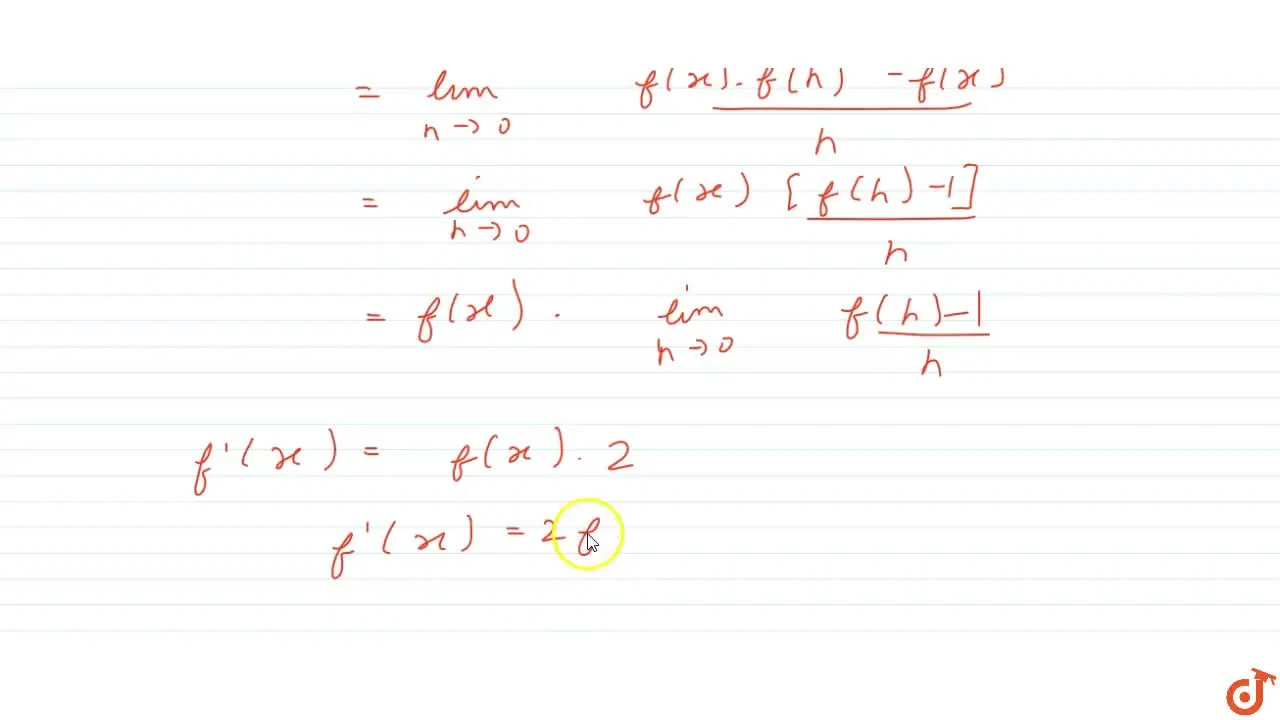A function f:R→R satisfies the equation f(x+y)=f(x)f(y) for allx,y∈R and f(x)≠0 for all x∈R. If f(x) is differentiable at x=0andf′(0)=2, then prove that f′(x)=2f(x).
Let f:R→R satisfies the equation f(x+y)=f(x).f(y),∀x,y∈R,f(x)≠0.
Let f(x) is differentiable at x=0 and f'(0)=2
⇒f'(0)=limx→0f(x)−f(0)x−0
⇒2=limx→0f(x)−f(0)x
⇒2=limh→0f(0+h)−f(0)h
⇒2=limh→0f'(0).f(h)−f(0)h
⇒2=limh→0f(0)[f(h)−1]h , [∵f(0)=f(h).....(i)]
Also, f'(x)=limh→0f(x+h)−f(x)h
=limh→0f(x).f(h)−f(x)h,[∵f(x+y)=f(x).f(y)]
=limh→0f(x)[f(h)−1]h=2f(x) , [using Eq. (i)]
∴f'(x)=2f(x)
Similar Questions
A function f:R→R satisfies the equation f(x+y)=f(x)f(y) for allx,y∈R and f(x)≠0 for all x∈R. If f(x) is differentiable at x=0andf′(0)=2, then prove that f′(x)=2f(x).
View SolutionIf a real valued function f(x) satisfies the equation f(x+y)=f(x)+f(y) for all x,y∈R then f(x) is
View SolutionA function f:R→R satisfy the equation f(x)f(y)−f(xy)=x+y for all x,y∈R and f(y)>0, then
View SolutionA function f:R→R satisfy the equation f(x).f(y)=f(x+y) for all x,y∈R and f(x)≠0 for any x∈R. Let the function be differentiable at x = 0 and f'(0)=2, Then :
View SolutionA function f:R→R satisfies that equation f(x+y)=f(x)f(y) for all x, y∈R , f(x)≠0 . Suppose that the function f(x) is differentiable at x=0 and f′(0)=2 . Prove that f′(x)=2 f(x) .
View SolutionA function f:R -> R satisfies the equation f(x+y)=f(x)f(y) for all x,y∈R.f(x)≠0 Suppose that the function is differentiable at x=0 and f′(0)=2. Prove that f′(x)=2f(x).
View SolutionA function f:R→R satisfies the equation f(x+y)=f(x).f(y) for all xy∈R,f(x)≠0. Suppose that the function is differentiable at x=0 and f'(0)=2, then prove that f'=2f(x).
View SolutionA function f:R→R satisfies the equation f(x+y)=f(x)f(y) for all values of x and y and for any x∈R,f(x)≠0. Suppose the function is differentiable at x=0 and f' (0) = 2, then for all x∈R,f(x)=
View SolutionIf a function f satisfies the conditions f(x+y)=f(x)+f(y)∀,x,y∈R, then f is :
View SolutionA function f:R→R satisfies the equation f(x+y)=f(x)f(y) for all values of x and y and for any x∈R,f(x)≠0. Suppose the function is differentiable at x=0 and f'(0)=2, then for all x∈R,f(x)=
View Solution


